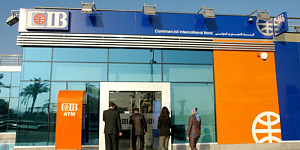Fitch Ratings has revised its outlook on four Egyptian banks to positive from stable, affirming their long-term issuer default ratings at B-, the US-based credit rating agency announced on Saturday.
The list includes three state-owned banks – the National Bank of Egypt (NBE), Banque Misr (BM), and Banque du Caire (BDC) – along with Commercial International Bank (CIB), Egypt’s largest private bank.
The agency further revised the outlooks on CIB's and BDC's capitalisation and leverage scores to positive from stable. It also revised the outlooks on NBE's and BM's capitalisation and leverage scores to stable from negative.
These revisions reflect reduced pressures on these banks’ capital ratios in the upcoming FY2024/2025 on the back of reduced pressure on the sovereign after recent foreign exchange inflows into Egypt.
The revisions on the four banks also conform to expectations of a broadly stable exchange rate and expected stronger profitability, which will build up the banks' capital.
They also come a few weeks after the agency revised its outlook on Egypt's long-term foreign-currency issuer Default Rating to positive from stable and affirmed the International Depository Receipts (IDR) at 'B-'.
Both actions came against the backdrop of the ease of the US dollar shortage crisis Egypt has suffered for over two years.
“The rating actions follow the revision of the Outlook on Egypt's sovereign rating and reflect the strong correlation of Egyptian banks' creditworthiness with that of the Egyptian sovereign,” according to Fitch.
Fitch also attributed its revision of the four banks to their viability ratings, which reflect the strong correlation between the banks' credit profiles and that of the sovereign, given their significant direct exposure to the government through sizeable holdings of the Egyptian government debt and lending to public sector companies.
Egyptian banking sector’s total exposure to the sovereign and the broader public sector at the end of 2023 recorded 53 percent of total assets, according to Fitch.
Recent FX inflows leading the scene
Fitch also highlighted several factors which had a positive impact on the Egyptian economy, including the $35 billion Ras El-Hekma development deal, the expansion of the country’s loan programme of the International Monetary Fund (IMF), the recent large investment from the UAE, and support packages from the IMF.
The agency further shed light on the recent foreign exchange (FX) rate flexibility and the significant improvement in foreign currency liquidity, stressing that these factors will boost Egypt’s macro stability in the upcoming FY2024/2025, starting 1 July.
According to Fitch, these drivers plus a stronger sovereign credit profile will be positive for banks' business and risk financial profiles.
Prime Minister Mostafa Madbouly announced that Egypt has received a fresh tranche of the $15 billion Ras El-Hekma deal, signed in February.
Similarly, the IMF expanded in March its Extended Fund Facility (EFF) loan programme for Egypt from $3 billion to $8 billion in response to the implications of the Israeli war on Gaza.
Other international financial institutions (IFIs) and partners have also committed finance bailout packages for Egypt, including the World Bank ($6 billion through 2026), the European Union ($8 billion through 2027), and the UK ($400 million).
Bank’s credit performance
“Credit performance should also benefit from easing inflation, lower input costs, and better foreign currency availability, with the sector's impaired loan ratio of three percent at the end of 2023 expected to remain broadly stable until the end of 2024,” Fitch explained.
For the second consecutive month, Egypt’s headline inflation cooled to below 33 percent (32.8 percent), down from 33.1 percent in March, according to the latest readings announced by Egypt’s Central Agency for Mobilization and Statistics (CAPMAS).
Over the medium term, Fitch expected the banks' performance to remain robust, supported by high interest rates, stronger business growth, and greater macroeconomic stability.
Since March 2022, Egypt’s key interest rates have been hiked by 19 percent (1900 bps), 8 percent of which has been applied since the beginning of 2024.
EGP devaluation to put pressure on banks
On the depreciation of the Egyptian pound, Fitch estimates that the Egyptian Pound has lost 34 percent of its value over the three devaluations Egypt applied since March 2022. The last depreciation was in March 2024, when the EGP lost over 60 percent of its value against the US dollar.
“We believe the weakening of the Egyptian pound against the US dollar has put pressure on banks' regulatory capital ratios, given their sensitivity to exchange-rate movements. However, they remain above minimum regulatory requirements. The sector's common equity ratio strengthened to 13 percent at the end of 2023 (from 11.1 percent at the end of 2022) on the back of strong profits, which likely came down by the first quarter of 2024 post-devaluation,” Fitch explained.
In that respect, Fitch expected banks’ capital ratios to recover during the rest of 2024, driven by strong profitability and healthy internal capital generation.
As per Fitch estimations, foreign-currency liquidity conditions have improved, with the banking sector's net foreign liability position falling to $2.8 billion in March 2024, from $17.5 billion in February 2024, supported by the banks' build-up of foreign assets by around $8 billion in March 2024, compared to February 2024.
“This was underpinned by strong capital inflows stemming from the Ras El-Hekma deal, remittances, and the return of sizeable non-resident inflows into the domestic market ($20 billion),” Fitch explained.
Fitch expected the banking sector to return to a net foreign assets position by the end of the first half of 2024 because of the continuing disbursement of funds under the Ras El-Hekma deal and recovering remittances and tourism receipts.








































